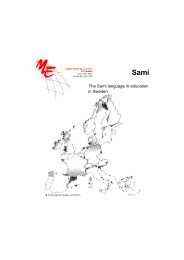Multilingual Early Language Transmission (MELT) - Mercator ...
Multilingual Early Language Transmission (MELT) - Mercator ...
Multilingual Early Language Transmission (MELT) - Mercator ...
You also want an ePaper? Increase the reach of your titles
YUMPU automatically turns print PDFs into web optimized ePapers that Google loves.
2.5 Brittany in France<br />
2.5.1 Background information<br />
In January 2007, the population of historic Brittany was estimated to be 4,365,500. 56<br />
Approximately 450,000 people understand Breton and the most recent census (2007) shows<br />
about 200,000 speakers.<br />
The Breton language is spoken mainly by inhabitants in the region of Brittany in the west of<br />
France, but also spoken in the main cities in the east called Breizh Uhel ‘Upper Brittany’.<br />
Almost all speakers are bilingual, they also speak fluent French. Breton language is a regional<br />
language in France. It is recognized in the French constitution as the other regional<br />
languages of France since 2008: “The regional languages are part of the French heritage”.<br />
Traditionally Breton is the language of a large part of Brittany, but over the centuries the<br />
linguistic border gradually moved westwards. Linguistically, Breton forms part of the<br />
Brittonic branch of the Celtic languages, to which Welsh and Cornish also belong. 57<br />
Several factors 58 have contributed to the decrease in numbers of speakers. Some social and<br />
economic developments have led to the decrease of Breton speakers; most Breton-speakers<br />
were farmers, fishermen and people in the rural areas, Breton was affected particularly by<br />
economic changes such as migration towards the cities in the last 30 years. Further, some<br />
official State behaviour was negative for the Breton language; In 1972, Mr Georges<br />
Pompidou, then President of France, stated that there was no place for regional languages.<br />
However, since the Deixonne law (1951 59 ) and subsequent implementation measures,<br />
Breton language and culture may be taught for up to three hours per week in public<br />
education if the teacher is willing and able to do so. To preserve the Breton language and<br />
culture a few parents created the first Diwan 60 school at Lampaul-Ploudalmézeau (Breton:<br />
Lambaol-Gwitalmeze) near Brest in 1977. The Diwan is an organisation of parents and<br />
teachers who wish to create cultural surroundings favouring the Breton language by means<br />
of schools. The first bilingual class in a public school opened in 1983 and the first bilingual<br />
class in a catholic school opened in 1990 61 .<br />
56<br />
Wikipedia http://en.wikipedia.org/wiki/Breton_language [Accessed June 2011].<br />
57<br />
<strong>Mercator</strong> European Research Centre on <strong>Multilingual</strong>ism and <strong>Language</strong> Learning, Regional Dossiers http://www.mercatorresearch.eu/research-projects/regional-dossiers<br />
[Accessed June 2011].<br />
58<br />
For more descriptions about the factors which have led to Breton becoming a threatened language: <strong>Mercator</strong> European Research Centre<br />
on <strong>Multilingual</strong>ism and <strong>Language</strong> Learning, Regional Dossiers http://www.mercator-research.eu/research-projects/regional-dossiers<br />
[Accessed June 2011].<br />
59<br />
A primary school teacher explained in a letter how the love of Breton is not incompatible with the love of France and how pedagogically<br />
the use of Breton is a tremendous tool to achieve a higher degree of fluency and accuracy in French. The letter is addressed to Maurice<br />
Deixonne, who was in charge to draft the legislative proposal which led to the formal, but limited, recognition of regional languages in<br />
1951. The original letter can be found in OURS (Office Universitaire de Recherche Socialiste, Paris) http://lslvm-pm4.ecs.soton.ac.uk/2239/<br />
[Accessed June 2011].<br />
60<br />
The Diwan website: http://www.diwanbreizh.org/?lang=french [Accessed June 2011].<br />
61<br />
NPLD, the questionnaires from the project ‘Pre-School Education’ (2010). http://www.npld.eu/currentprojectsbestpractise/pre-<br />
schooled/pages/default.aspx [Accessed June 2011].<br />
37



